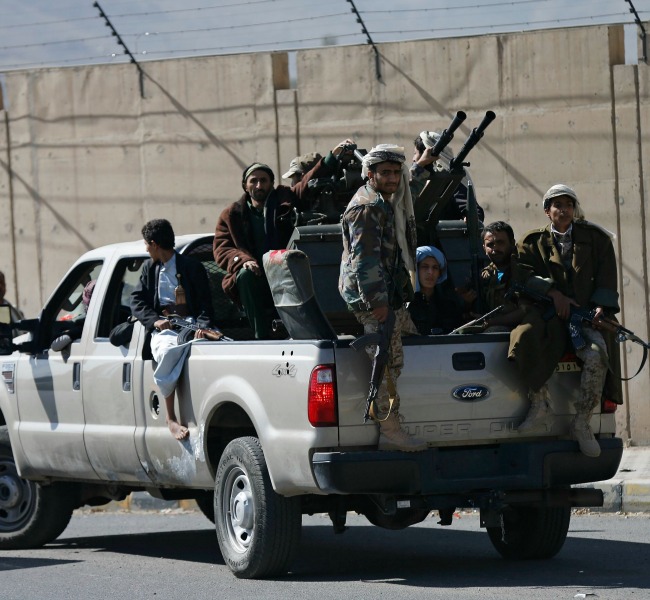Yemen's minority Shi'ite Houthi fighters took up guard at President Abd-Rabbu Mansour Hadi's home on Wednesday but said they had not toppled him, after two days of fighting which left little doubt that the enfeebled leader was now at their mercy.
 Houthi fighters ride a military truck outside the Presidential Palace in Sanaa January 21, 2015. Armed fighters from Yemen's powerful Houthi movement stood guard on Wednesday outside the private residence of President Abd-Rabbu Mansour Hadi, whose home is normally protected by presidential security officers, witnesses said. Houthi fighters battled guards at Hadi's home and entered his palace on Tuesday. AgenciesReuters
Houthi fighters ride a military truck outside the Presidential Palace in Sanaa January 21, 2015. Armed fighters from Yemen's powerful Houthi movement stood guard on Wednesday outside the private residence of President Abd-Rabbu Mansour Hadi, whose home is normally protected by presidential security officers, witnesses said. Houthi fighters battled guards at Hadi's home and entered his palace on Tuesday. AgenciesReuters
Yemen's minority Shi'ite Houthi fighters took up guard at President Abd-Rabbu Mansour Hadi's home on Wednesday but said they had not toppled him, after two days of fighting which left little doubt that the enfeebled leader was now at their mercy.
The Houthis, friendly to Iran, swept into the capital four months ago and have emerged as the dominant force in the country. For now at least they appear to have decided to stop short of overthrowing Hadi, possibly preferring to exert control over a weakened leader rather than take on the burden of power.
Their defeat of the presidential guards in gunbattles and artillery duels in recent days adds to disarray in a country where the United States is also carrying out drone strikes against one of the most powerful branches of al Qaeda. After clashes at the president's office and home on Tuesday, the Houthis' leader threatened in a speech overnight to take further "measures" unless Hadi bows to his demand for constitutional changes that would increase Houthi power.
By early morning on Wednesday, Houthi fighters, accompanied by an armoured vehicle, had replaced the guards at the president's residence. Presidential guard sentry posts were initially empty, however a few guards later appeared and were permitted to take up positions.
Yemeni military sources said the Houthis also seized the military aviation college located close to Hadi's home, and the main missile base in Sanaa, without a fight. In the south of the country, Hadi's home region, local officials denounced what they called a coup against him and shut the air and sea ports of the south's main city, Aden.
Yemen, an impoverished nation of 25 million, has been plagued by Islamist insurgency, separatist conflict, sectarian strife and economic crisis for years. An "Arab Spring" popular uprising in 2011 led to the downfall of long-ruling President Ali Abdullah Saleh, bringing more chaos.
The Houthis, rebels from the north drawn from a large Shi'ite minority that ruled a 1,000-year kingdom in Yemen until 1962, stormed into the capital in September but had mostly held back from directly challenging Hadi until last week, when they detained his chief of staff. They accuse the president of seeking to bypass a power-sharing deal signed when they seized Sanaa in September, and say they are also working to protect state institutions from corrupt civil servants and officers trying to plunder state property.
Houthi fighters battled guards at Hadi's home and entered the presidential palace on Tuesday. In his televised speech that followed, the group's leader Abdel-Malek al-Houthi warned Hadi that he had to implement the power-sharing deal.
"We ... will not hesitate to impose any necessary measures to implement the peace and partnership agreement," said Abdel-Malek, whose Shi'ite Muslim group is widely seen as an ally of Iran in its regional struggle for influence with Saudi Arabia. "All the options are open and without exception and the ceiling is very, very high. And this is why, I here advise the president ... Implement this deal. It is for your benefit and for the benefit of your people," he said on live television.
The accord gives the Shi'ite Muslim group, which takes its name from the family of its leader, a role in all military and civil state bodies. The Houthis also demand changes to the divisions of regional power in a draft constitution. Their decision to stop short of toppling Hadi, an ally of the West and supporter of US drone strikes, may be intended to keep regional Sunni Muslim states and the United States from rallying against them.
A government source said, "They know that if they bring about the downfall of the president, they won't be able to rule the country, because Western and neighbouring countries will gang on up on them, as well as other provinces that are not under their control." Abdel-Malek's speech left little doubt however that his movement was now in effective control of the country. Al Masdar newspaper referred to him as "the president's president".
"AGGRESSIVE COUP"
The local security committee of Aden, the main city in the south, said it has ordered the airport, sea port and all land crossings closed until further notice. It denounced an "aggressive coup against the president personally and the political process as a whole".
The emergence of the Houthis as Yemen's de facto top power in September has scrambled alliances across Yemen's political spectrum, raising fears of deeper instability in a country that shares a border with top oil exporter Saudi Arabia and has one of al Qaeda's most active branches.
Foreign ministers of Gulf Arab states, allies of Hadi, were due to discuss the crisis in Yemen at an emergency meeting in the Saudi capital Riyadh later on Wednesday. Iran called for Yemen's differences to be resolved through discussion: "Misunderstandings among Yemeni political groups need to be removed through talks," parliament speaker Ali Larijani said on a visit to Turkey.

No comments :
Post a Comment